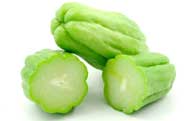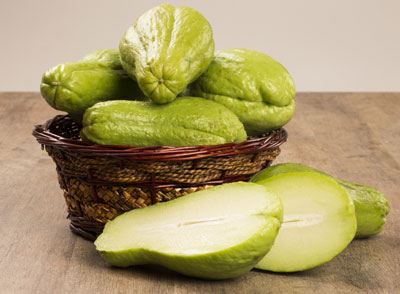





1. Choko Facts
2. Types of Choko
3. Nutritional Value of Choko
4. Health Benefits of Choko
The scientific name for choko is Sechium edule. It is a member of the gourd family, Cucurbitaceae, which also includes cucumbers, squash, and melons.
Other choko names include, Chayote, Alligator Pear, Mirliton, or in China it can be referred as fóshǒuguā, meaning 'Buddha's Palms Melon'. In India, the fruit is called chow chow among other names.
History and Origin
The choko, also known as chayote, originated in Mesoamerica, likely southern Mexico or Guatemala, where it was cultivated by ancient civilizations like the Aztecs. After the Spanish conquest in the 16th century, it was spread globally through the Columbian exchange and became a staple in warm climates. In Australia, it was likely introduced by Chinese immigrants during the Gold Rush and became a common, prolific food source, particularly during the Great Depression.
- • Green Choko
- • White Choko
- • Yellow to cream-colored Choko
The main types of choko sold in Australia are green and white, which are variations of the same species, Sechium edule. The fruit can be smooth-skinned (commercially grown) or spiky (wild varieties) and is also known as chayote or vegetable pear.
Choko types:
Green choko: The most common type, it has a green, pear-shaped fruit.
Green choko is the most common type, a pear-shaped vegetable with a mild, zucchini-like flavour, that is versatile in cooking. Its flesh is light and crunchy, and it can be eaten raw or cooked. The skin is green and can be smooth or slightly spiky, depending on the variety.
White choko: A less common, heirloom variety that is also pear-shaped but has a white or creamy colour.
A white choko, also known as chayote, is a pear-shaped, creamy-white climbing vegetable from the gourd family with a delicate, nutty flavour. It is a versatile ingredient used in various dishes, and can be eaten raw or cooked by boiling, frying, baking, or grilling. White chokos are similar to green chokos, with the primary difference being their colour.
A yellow or cream-colored choko: is a mature or ripened fruit. While most varieties found overseas can be yellow to cream, it is a sign of maturity, meaning it has been left on the vine longer and may have a larger seed. Some varieties are specifically a light or cream colour, but a yellowing choko indicates it is ripe, similar to how the fruit's skin darkens with age.
Maturity: Yellow and cream-colored chokos are riper than the standard green ones.
Seed size: Due to maturity, these fruits may have a larger seed inside.
Flavour and texture: As the fruit ripens, its flavour becomes less sweet and it develops a more fibrous texture, especially around the seed.
Harvesting: Harvest chokos when they are 10-20 cm long for best results. If the fruit has started to root on the vine, it indicates a high level of maturity.
Variety: While some varieties are typically green, others can be yellow to cream, indicating a different type of choko.
Fruit ” Choko ” ( Nutritional value )
Nutritional value per 100 g
Chayote, fruit, cooked, boiled, drained, with salt
|
Nutrient ( Proximate’s )
|
Unit
|
Value
|
Daily Value %
|
|
Energy
|
kcal
|
22
|
1.1%
|
|
Protein
|
g
|
0.62
|
1.2%
|
|
Total lipid (fat)
|
g
|
0.48
|
0.6%
|
|
Carbohydrate, by difference
|
g
|
4.50
|
1.6%
|
|
Fiber, total dietary
|
g
|
2.8
|
10%
|
|
Sugars, total
|
g
|
1.89
|
|
|
Minerals
|
|||
|
Calcium, Ca
|
mg
|
13
|
1%
|
|
Iron, Fe
|
mg
|
0.22
|
1.2%
|
|
Magnesium, Mg
|
mg
|
12
|
2.8%
|
|
Phosphorus, P
|
mg
|
29
|
2.3%
|
|
Potassium, K
|
mg
|
173
|
3.6%
|
|
Sodium, Na
|
mg
|
237
|
10.3%
|
|
Zinc, Zn
|
mg
|
0.31
|
2.8%
|
|
Copper, Cu
|
mg
|
0.110
|
12.2%
|
|
Manganese, Mn
|
mg
|
0.169
|
7.3%
|
|
Selenium, Se
|
mcg
|
0.3
|
0.5%
|
|
Vitamins
|
|||
|
Vitamin C, total ascorbic acid
|
mg
|
8.0
|
8.8%
|
|
Thiamin (B-1)
|
mg
|
0.026
|
2.1%
|
|
Riboflavin (B-2)
|
mg
|
0.040
|
3.0%
|
|
Niacin (B-3)
|
mg
|
0.420
|
2.6%
|
|
Pantothenic acid (B-5)
|
mg
|
0.408
|
8.1%
|
|
Vitamin B-6
|
mg
|
0.118
|
6.9%
|
|
Vitamin B-12
|
mg
|
0.00
|
|
|
Folate DFE (dietary folate) (B-9)
|
mcg
|
18
|
4.5%
|
|
Vitamin A, RAE (retinol)
|
mcg
|
||
|
Vitamin E (alpha-tocopherol)
|
mg
|
0.14
|
0.9%
|
|
Vitamin D (D2 + D3)
|
mcg
|
0
|
0
|
|
Vitamin K (phylloquinone)
|
mcg
|
4.7
|
3.9%
|
|
Lipids
|
|||
|
Saturated Fatty Acids
|
g
|
0.031
|
0.1%
|
|
Monounsaturated Fatty Acids
|
g
|
0.010
|
|
|
Polyunsaturated Fatty Acids
|
g
|
0.065
|
|
|
Trans Fatty Acids
|
g
|
0.000
|
|
|
Carotenoids
|
|||
|
Beta-Carotene
|
mcg
|
0
|
|
|
Lutein + zeaxanthin
|
mcg
|
0
|
|

|
Reference Values are based on a 2,000 Calorie Intake, for Adults and Children 4 or More Years of Age. Your daily values may be higher or lower depending on your calorie needs.
|
|
Percentages are roughly approximated using (RDA) Recommended Dietary Allowances for adults. Source: Nutrient Database – USDA (United States Department of Agriculture)
|
|
Reference Values for Nutrition – FDA U.S. Food and Drug Administration
|
Choko Nutritional Value
Chokos (chayote squash) are nutritious vegetables that offer health benefits by providing vitamins, minerals, and fiber, which supports heart and digestive health, boosts immunity, helps regulate blood sugar, and may aid in weight loss. They are rich in antioxidants like Vitamin C, and minerals such as potassium and magnesium, contributing to overall health and protection against chronic conditions
- SUPPORTS HEALTHY PREGNANCY
Choko (chayote squash) is a good source of folate, an essential nutrient for a healthy pregnancy that is crucial for foetal development and helps prevent neural tube defects. Folate is vital for cell growth and development, particularly in the early stages of pregnancy when the brain and spinal cord are forming. - MAY CONTROL BLOOD SUGAR
Choko (chayote) may help control blood sugar due to its fiber content and other compounds that increase insulin sensitivity. The soluble fiber slows carbohydrate digestion, while both soluble and insoluble fiber contribute to lower blood sugar responses after meals and improved insulin sensitivity. - BOOSTS DIGESTIVE HEALTH
Choko (chayote) boosts digestive health due to its high fiber content, which promotes bowel regularity, prevents constipation, and feeds beneficial gut bacteria. The fiber also aids in nutrient absorption and helps regulate blood sugar by slowing down glucose absorption. This combination supports a healthy gut and can help prevent conditions like diverticular disease. - PROVIDES ANTIOXIDANT PROTECTION
Choko (chayote) provides antioxidant protection through its rich content of antioxidants like vitamin C, flavonoids, and other polyphenols, which help neutralize free radicals, reduce oxidative stress, and protect cells from damage. It contains potent compounds such as myricetin, quercetin, and kaempferol that have anti-inflammatory properties and may protect against diseases like certain cancers and heart disease.

- ENHANCES IMMUNE FUNCTION
Choko (chayote) enhances immune function due to its rich content of vitamins like C and minerals like zinc and manganese, which are vital for immune system function. Choko antioxidants, such as flavonoids and polyphenols, help combat cell damage and inflammation, supporting a resilient immune response. Chayote also contains polysaccharides that may modulate the immune response. - SUPPORTS HEART HEALTH
Choko (chayote) supports heart health by helping to manage blood pressure, lower cholesterol, and improve blood flow through its fiber, potassium, and antioxidant content. It is rich in potassium, which helps regulate blood pressure, and antioxidants like myricetin and flavonoids, which may lower cholesterol and prevent atherosclerosis. The high fiber content of choko also contributes to a reduced risk of heart disease. - RICH IN NUTRIENTS
Choko (chayote) is a nutrient-dense vegetable, rich in vitamins C and K, folate, and minerals like potassium and magnesium. It is also high in dietary fiber and antioxidants, which contribute to digestive health, immune function, and overall well-being. - AIDS IN WEIGHT MANAGEMENT
Choko (chayote) Chayote aids in weight management because it is low in calories, high in fiber, and contains a high-water content. This combination helps you feel full and satisfied, which can reduce overall calorie intake. The fiber also aids digestion and can help prevent constipation.
References
Nutrient Database – USDA (United States Department of Agriculture)
Reference Values for Nutrition – FDA U.S. Food and Drug Administration
Supports healthy pregnancy - Choko (chayote squash) is a good source of folate, an essential nutrient for a healthy pregnancy that is crucial for foetal development and helps prevent neural tube defects. Folate is vital for cell growth and development, particularly in the early stages of pregnancy when the brain and spinal cord are forming.
Rich in Nutrients - Choko (chayote) is a nutrient-dense vegetable, rich in vitamins C and K, folate, and minerals like potassium and magnesium. It is also high in dietary fiber and antioxidants, which contribute to digestive health, immune function, and overall well-being.
Supports Heart Health - Choko (chayote) supports heart health by helping to manage blood pressure, lower cholesterol, and improve blood flow through its fiber, potassium, and antioxidant content. It is rich in potassium, which helps regulate blood pressure, and antioxidants like myricetin and flavonoids, which may lower cholesterol and prevent atherosclerosis. The high fiber content also contributes to a reduced risk of heart disease.
Boosts Digestive Health - Choko (chayote) boosts digestive health due to its high fiber content, which promotes bowel regularity, prevents constipation, and feeds beneficial gut bacteria. The fiber also aids in nutrient absorption and helps regulate blood sugar by slowing down glucose absorption. This combination supports a healthy gut and can help prevent conditions like diverticular disease.
Enhances Immune Function - Choko (chayote) enhances immune function due to its rich content of vitamins like C and minerals like zinc and manganese, which are vital for immune system function. Its antioxidants, such as flavonoids and polyphenols, help combat cell damage and inflammation, supporting a resilient immune response. Chayote also contains polysaccharides that may modulate the immune response.
May Control Blood Sugar - Choko (chayote) may help control blood sugar due to its fiber content and other compounds that increase insulin sensitivity. The soluble fiber slows carbohydrate digestion, while both soluble and insoluble fiber contribute to lower blood sugar responses after meals and improved insulin sensitivity.
Aids in Weight Management - Choko (chayote) Chayote aids in weight management because it is low in calories, high in fiber, and contains a high-water content. This combination helps you feel full and satisfied, which can reduce overall calorie intake. The fiber also aids digestion and can help prevent constipation.
Provides Antioxidant Protection - Choko (chayote) provides antioxidant protection through its rich content of antioxidants like vitamin C, flavonoids, and other polyphenols, which help neutralize free radicals, reduce oxidative stress, and protect cells from damage. It contains potent compounds such as myricetin, quercetin, and kaempferol that have anti-inflammatory properties and may protect against diseases like certain cancers and heart disease.
Chokos contain antioxidants like quercetin, myricetin, and kaempferol, which help fight free radicals and may reduce the risk of chronic diseases like cancer and diabetes.
Antioxidants - Choko (chayote) contains a variety of antioxidants, including flavonoids, vitamin C, and polyphenols, which may help protect against oxidative stress and inflammation. These compounds are linked to potential health benefits such as improved heart health by lowering blood pressure and cholesterol and protecting skin from UV damage. Some studies even suggest chayote consumption can have beneficial effects for older adults with metabolic syndrome.
